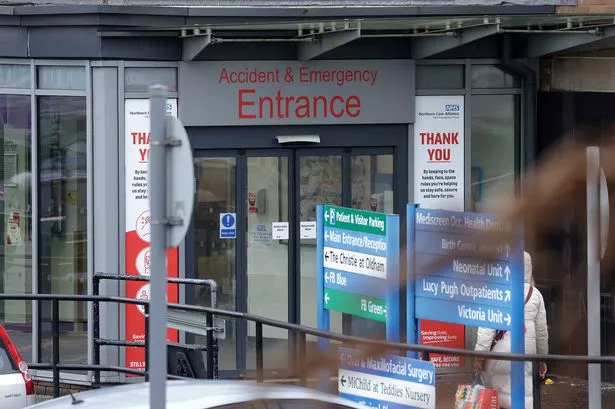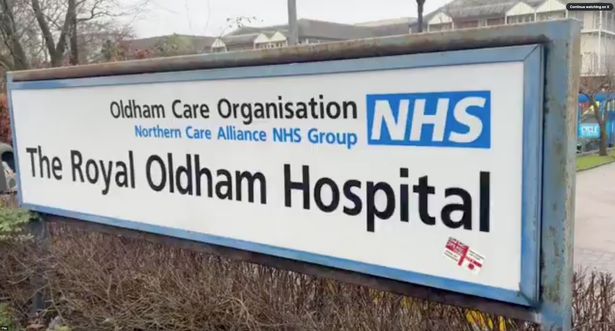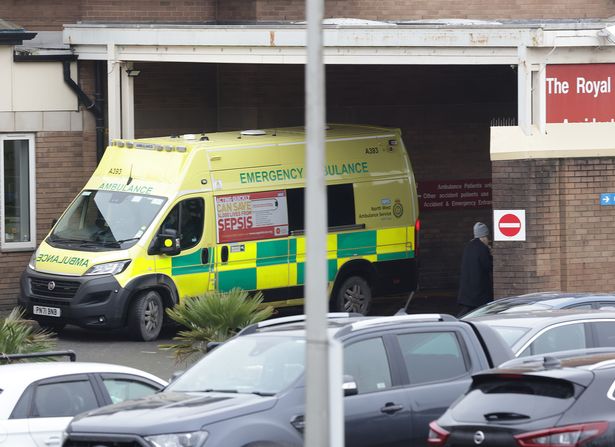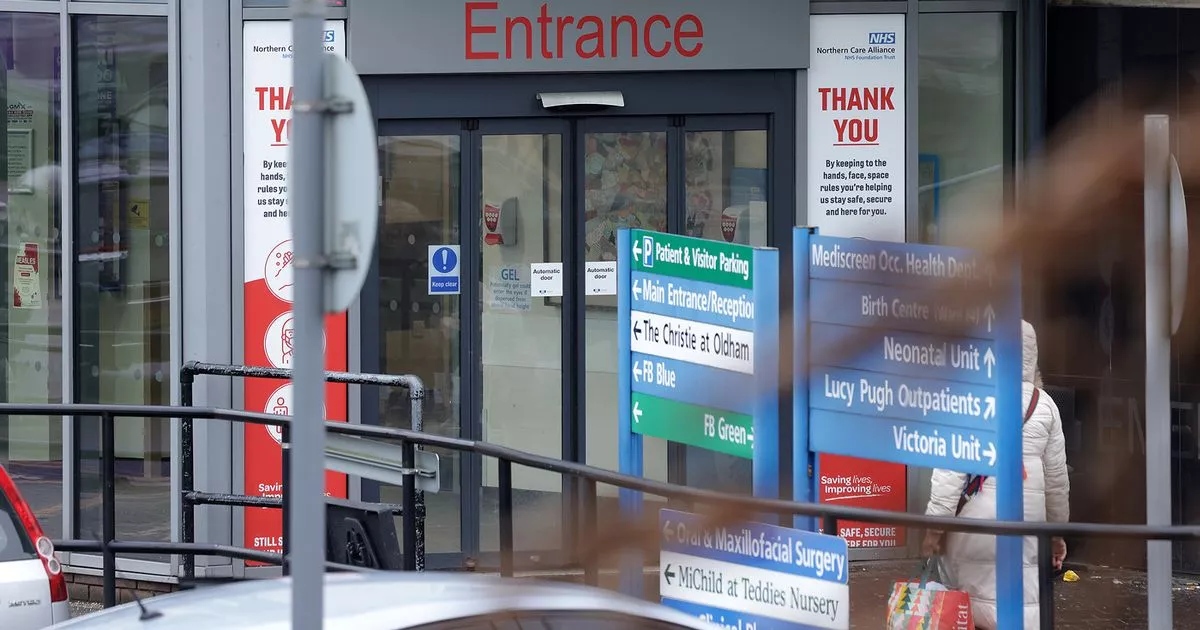The inspection was prompted by ‘information of concern’ The Royal Oldham Hospital has been told to make ‘rapid’ improvements to ‘safety, oversight, and the dignity of people being cared for in temporary escalation spaces'(Image: Manchester Evening News)
The Royal Oldham Hospital has been told to make ‘rapid’ improvements to ‘safety, oversight, and the dignity of people being cared for in temporary escalation spaces'(Image: Manchester Evening News)
A Greater Manchester hospital has been served with an urgent warning from the health and care watchdog after an inspection of its medical care services.
The Royal Oldham Hospital has been told to make ‘rapid’ improvements to ‘safety, oversight, and the dignity of people being cared for in temporary escalation spaces’. Using temporary escalation spaces is often referred to as delivering ‘corridor care’, where a hospital’s capacity is overwhelmed and there are too many patients for the number of A&E cubicles, beds and ward spaces.
The health watchdog, the Care Quality Commission (CQC), said it found ‘a breach in regulations’ at the hospital, but did not confirm the exact breach. In other hospitals nationally, temporary escalation spaces are unplanned and can include patients waiting, being seen by medics and treated in waiting rooms, corridors, or the back of ambulances outside A&E.
The CQC has rated medical care services at the Royal Oldham Hospital as ‘requires improvement’ following an inspection in August last year. The hospital’s medical care had previously been rated as requires improvement back in 2022.
The inspection was prompted by ‘information of concern’ about the quality of care of the medical care services, according to the CQC. The information was handed to the CQC by the public, the watchdog has said.
The hospital has said: “Since the inspection, we’ve been working on addressing issues that the CQC highlighted. One key area has been finding a different way to safely transfer patients from the emergency department to medical wards during times of high pressure on our services.”
 ‘The trust must make improvements’, said the watchdog(Image: MEN)
‘The trust must make improvements’, said the watchdog(Image: MEN)
Following this inspection, in October last year, the CQC says it issued a warning notice to ‘focus the trust’s attention on making specific improvements to the safety, oversight, and the dignity of people being cared for in temporary escalation spaces after finding a breach in regulations’.
In a report last year, the NHS said: “NHS England believes the delivery of care in temporary escalation spaces (TES) in departments experiencing patient crowding (including beds and chairs) is not acceptable and should not be considered as standard.
“TES do not include spaces that are opened as part of winter pressure planning and refer to care given in any unplanned settings (such as corridors). However, the current healthcare landscape means that some providers are using temporary escalation spaces more regularly – and this use is no longer ‘in extremis’.”
The CQC says it also found other breaches at the hospital which were not part of the warning notice in regulations linked to staffing, health and safety, and how the service was being managed.
“Our concerns included the trust not having clear processes for decision making, clinical and environmental risk assessments relating to the transfer of patients to non-clinical spaces on medical wards as part of the model,” reads the watchdog’s report, published today (April 30).
“We also identified regulatory breaches relating to responsivity, medicines management, and health and safety that did not form part of the warning notice.”
Alison Chilton, CQC’s Deputy Director of Operations in Greater Manchester said: “When we inspected medical care services at Royal Oldham Hospital, we found staff who showed kindness and compassion in their day-to-day work. We were also pleased to see the improvements leaders had made to how responsive the service was to people’s individual needs.
“However, the trust must make improvements in the model they used to care for people in temporary escalation spaces as we had concerns about people’s safety and dignity. Our concerns included the trust not having clear processes for decision making, and a lack of clinical and environmental risk assessments. Staff had also raised similar concerns to leaders but hadn’t felt listened to.
“This is why we issued the trust with a warning notice, to focus their attention on making those changes rapidly. They also had some work to do around staffing, health and safety, and how the service was being managed.”
 Some areas of the service, including its staff, were praised by the CQC(Image: Manchester Evening News)
Some areas of the service, including its staff, were praised by the CQC(Image: Manchester Evening News)
The latest inspection only covered medical care services. The rating for the hospital, including all of the services it provides, is requires improvement following an overall inspection in 2022.
Professor Heather Caudle, Chief Nursing Officer at the Northern Care Alliance NHS Foundation Trust, which runs the Royal Oldham Hospital, said: “We welcome the Care Quality Commission’s feedback report and we’re grateful to patients, their loved ones and colleagues who were part of this inspection. When people provide their views and share their experiences, we learn what we’re doing right and what we need to do differently.
“Since the inspection, we’ve been working on addressing issues that the CQC highlighted. One key area has been finding a different way to safely transfer patients from the emergency department to medical wards during times of high pressure on our services.”
Ms Chilton continued: “Despite these issues, there had been improvements in how responsive the service was. They understood the diverse health and care needs of local communities and provided information in formats tailored to people’s individual needs. People using the service also told us they were involved in making their care plans and felt treated as individuals, with their protected characteristics considered.
“Staff showed kindness and compassion, and we saw a nurse on the geriatric medical unit skilfully de-escalate a challenging situation involving someone with complex needs.
“We’ve told leaders where we expect to see improvements and will monitor them to make sure people are safe whilst this happens.”
The CQC found some areas of improvement in medical care services. As a result, the rating for how responsive the service is has moved from requires improvement to good.
Safety, effectiveness, and leadership have been rated as requires improvement again, the watchdog said, and how caring the service is has again been rated as good.
“In terms of the CQC’s other findings, we’re really pleased they experienced a positive safety-focused culture during their time within medical care services,” said Prof Caudle. “We were also extremely proud our colleagues were noticed for how caring and compassionate they are, how they work hard to treat patients as individuals and do their best to personalise care.”
The Manchester Evening News has put questions to the trust over what the hospital was using as temporary escalation space to prompt CQC concern.
